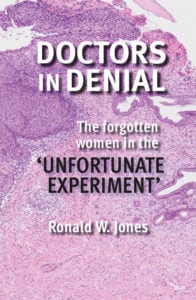
Prof Ronald Jones gives a detailed account of the ‘unfortunate experiment’ (as it came to be known in the lay press internationally) from Herb Green’s initial decision in the 1960s to leave carcinoma in situ of the cervix untreated, through to its ramifications today. Having grown up during the saga and knowing many of those involved, I had trouble putting the book down. I deem this book compulsory reading for all O&Gs. We are privileged to have this first-hand account of an embarrassing era in our history from our colleague, Ron Jones. I still remember reading Herb Green’s article as a trainee and thinking ‘Hang on, this doesn’t add up’.
The title says it all; for the past half century, groups of senior doctors have denied the harm arising from the ‘unfortunate experiment’, forgetting the plight of the victims. The events described by Jones are incredible and have been played out during the working lives of many of us. Were New Zealand’s relative geographical isolation and the reputation and dominance of the postgraduate school of obstetrics and gynaecology factors? It is astonishing that the experiment was approved in the first place and that it was not stopped when the first cancers began to appear. Concerns were raised to an in-house investigating committee and the silence when the world was informed of the outcome of the experiment in the 1984 paper of Jones et al, implicates us all.
The two case histories described in the book clearly point to Green’s disordered thinking and his quixotic attitude towards his patients’ wellbeing. Difficulties inevitably arise with colleagues who hold differing views, those with personality disorders, those with power complexes and those who are not team players.
While the responsibility for the ‘unfortunate experiment’ clearly lay with the senior members of the academic staff and three senior medical administrators who elected not to become involved, Jones points out that this was a systemic failure involving Green’s hospital colleagues, and human frailties – a cogent warning for those involved in medical practice today. A particularly sad aspect of this story is the admission by Green’s close friend and colleague, Sir Mont Liggins, that he and Sir William Liley – both pioneers in the field of perinatal research – ‘….understood about scientific research and hypotheses at the time but chose not to intervene but to turn a blind eye’.
One of Jones’ phrases continues to resonate: ‘This is a story of two cancers – one physical and one moral.’ The intellectual and clinical attributes of the men (and they were all men) have never been in question, but the moral compass is repeatedly questioned throughout the book. There is no doubt that medical power and a well-established hierarchy, strong personalities and intimidation were used to bolster the positions of those who were best placed to stop the experiment, a situation that could be repeated.
The role of various Royal Colleges and their members during this long saga warrants comment. In 1975, respected senior New Zealand Fellows of the Royal College of Obstetricians and Gynaecologists were asked to investigate cases of Green’s patients developing cancer. They avoided addressing the harms arising from the experiment which, as a consequence, was allowed to continue. In 1988, the Royal New Zealand College of Obstetricians and Gynaecologists failed to apologise to the victims after the release of the Report of the Cervical Cancer (Cartwright) Inquiry – indeed, some senior Fellows continued to undermine it and support ‘revisionism’. In addition, the College declined to offer an apology to the patients. By contrast, the current RANZCOG Council took advice from senior College Fellows and deserves credit for the unqualified apology it gave to the victims at the time Jones’ book was launched.
For years I have wanted to write an article on mindsets in medical practice, having witnessed the harm that can result from this psychopathology, Ron Jones has saved me the trouble.





Leave a Reply